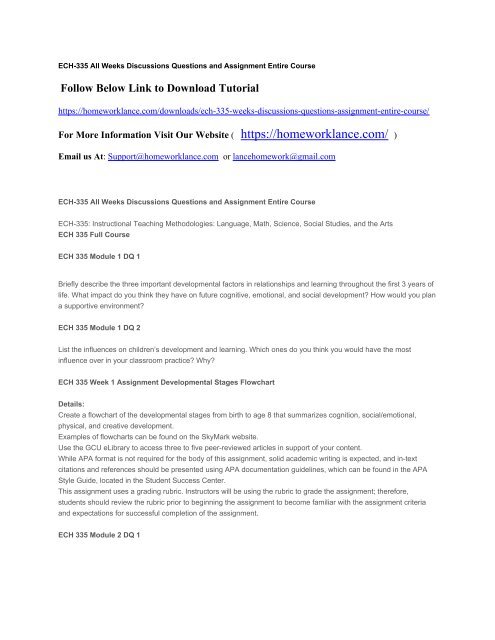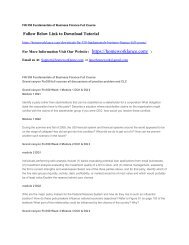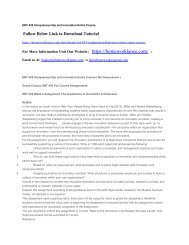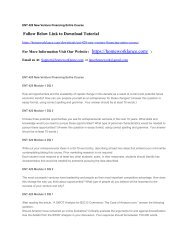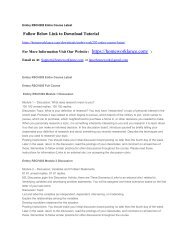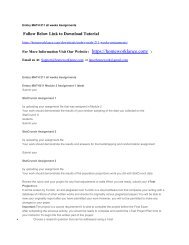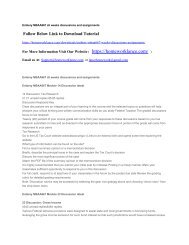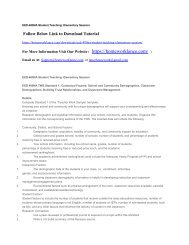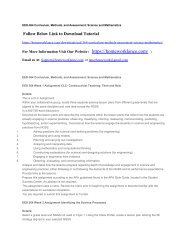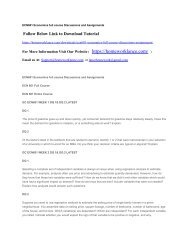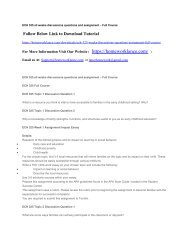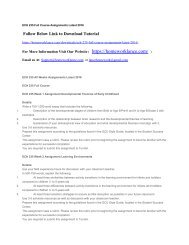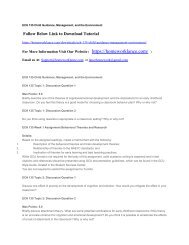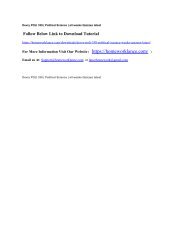ECH-335 All Weeks Discussions Questions and Assignment Entire Course
You also want an ePaper? Increase the reach of your titles
YUMPU automatically turns print PDFs into web optimized ePapers that Google loves.
<strong>ECH</strong>-<strong>335</strong> <strong>All</strong> <strong>Weeks</strong> <strong>Discussions</strong> <strong>Questions</strong> <strong>and</strong> <strong>Assignment</strong> <strong>Entire</strong> <strong>Course</strong><br />
Follow Below Link to Download Tutorial<br />
https://homeworklance.com/downloads/ech-<strong>335</strong>-weeks-discussions-questions-assignment-entire-course/<br />
For More Information Visit Our Website ( https://homeworklance.com/ )<br />
Email us At: Support@homeworklance.com or lancehomework@gmail.com<br />
<strong>ECH</strong>-<strong>335</strong> <strong>All</strong> <strong>Weeks</strong> <strong>Discussions</strong> <strong>Questions</strong> <strong>and</strong> <strong>Assignment</strong> <strong>Entire</strong> <strong>Course</strong><br />
<strong>ECH</strong>-<strong>335</strong>: Instructional Teaching Methodologies: Language, Math, Science, Social Studies, <strong>and</strong> the Arts<br />
<strong>ECH</strong> <strong>335</strong> Full <strong>Course</strong><br />
<strong>ECH</strong> <strong>335</strong> Module 1 DQ 1<br />
Briefly describe the three important developmental factors in relationships <strong>and</strong> learning throughout the first 3 years of<br />
life. What impact do you think they have on future cognitive, emotional, <strong>and</strong> social development? How would you plan<br />
a supportive environment?<br />
<strong>ECH</strong> <strong>335</strong> Module 1 DQ 2<br />
List the influences on children’s development <strong>and</strong> learning. Which ones do you think you would have the most<br />
influence over in your classroom practice? Why?<br />
<strong>ECH</strong> <strong>335</strong> Week 1 <strong>Assignment</strong> Developmental Stages Flowchart<br />
Details:<br />
Create a flowchart of the developmental stages from birth to age 8 that summarizes cognition, social/emotional,<br />
physical, <strong>and</strong> creative development.<br />
Examples of flowcharts can be found on the SkyMark website.<br />
Use the GCU eLibrary to access three to five peer-reviewed articles in support of your content.<br />
While APA format is not required for the body of this assignment, solid academic writing is expected, <strong>and</strong> in-text<br />
citations <strong>and</strong> references should be presented using APA documentation guidelines, which can be found in the APA<br />
Style Guide, located in the Student Success Center.<br />
This assignment uses a grading rubric. Instructors will be using the rubric to grade the assignment; therefore,<br />
students should review the rubric prior to beginning the assignment to become familiar with the assignment criteria<br />
<strong>and</strong> expectations for successful completion of the assignment.<br />
<strong>ECH</strong> <strong>335</strong> Module 2 DQ 1
Give an example of how modern technology/research has changed your perspective on how infants/young children<br />
learn. How did your perspective change because of this <strong>and</strong> what are the implications for you as a classroom<br />
teacher?<br />
<strong>ECH</strong> <strong>335</strong> Module 2 DQ 2<br />
What are mental representations <strong>and</strong> why are they a critical factor in the ability of young children to create <strong>and</strong> use<br />
symbols?<br />
<strong>ECH</strong> <strong>335</strong> Week 2 <strong>Assignment</strong> High Order Thinking Checklist<br />
Details:<br />
Create an observational checklist of characteristics of the development of higher order thinking <strong>and</strong> symbol usage for<br />
a specific age b<strong>and</strong> (infant, toddler, preschooler, kindergartner, primary grade student).<br />
In addition to the assigned readings for this module, utilize the GCU eLibrary for a minimum of three peer-reviewed<br />
articles in support of your content.<br />
While APA format is not required for the body of this assignment, solid academic writing is expected, <strong>and</strong> in-text<br />
citations <strong>and</strong> references should be presented using APA documentation guidelines, which can be found in the APA<br />
Style Guide, located in the Student Success Center.<br />
This assignment uses a grading rubric. Instructors will be using the rubric to grade the assignment; therefore,<br />
students should review the rubric prior to beginning the assignment to become familiar with the assignment criteria<br />
<strong>and</strong> expectations for successful completion of the assignment.<br />
<strong>ECH</strong> <strong>335</strong> Module 3 DQ 1<br />
What are content <strong>and</strong> learning st<strong>and</strong>ards? Why are they important?<br />
<strong>ECH</strong> <strong>335</strong> Module 3 DQ 2<br />
What is the most important difference between purely student-centered <strong>and</strong> purely teacher-centered philosophies?<br />
Are they both valid? Why or why not?<br />
<strong>ECH</strong> <strong>335</strong> Week 3 <strong>Assignment</strong> Online Lesson Plans Analysis<br />
Details:<br />
Research a variety of lesson plans online. Analyze three different plans for three different content areas <strong>and</strong> age<br />
levels (Preschool, PK, K, 1st, 2nd, or 3rd grade) using the rubric provided.<br />
Recreate the online lesson plans filling in any gaps you found. Justify any changes you made <strong>and</strong> aspects that<br />
remained the same. Include the links to the original plans for your instructor’s reference.<br />
APA format is not required, but solid academic writing is expected.<br />
<strong>ECH</strong> <strong>335</strong> Module 3 <strong>Assignment</strong> Practicum/Observation Lesson Plan Analysis<br />
Details:<br />
Through your practicum/field experience, select one lesson plan each from three different content areas that either of<br />
your mentor teachers will be teaching to their class. Analyze the plans <strong>and</strong> hypothesize the teacher’s teaching<br />
philosophies. Look for the components of effective lesson planning.<br />
Observe the lessons being taught.
Write a 500-word summary in which you share your philosophical analysis <strong>and</strong> the accuracy of your hypotheses.<br />
Support your hypotheses with examples from the lessons.<br />
APA format is not required, but solid academic writing is expected.<br />
This assignment uses a grading rubric. Instructors will be using the rubric to grade the assignment; therefore,<br />
students should review the rubric prior to beginning the assignment to become familiar with the assignment criteria<br />
<strong>and</strong> expectations for successful completion of the assignment.<br />
When submitting this assignment, attach the teacher’s lesson plans you analyzed, along with your notes.<br />
<strong>ECH</strong> <strong>335</strong> Module 4 DQ 1<br />
How early does concept formation begin in child development related to literacy? How would you support this<br />
development in an early learning setting?<br />
<strong>ECH</strong> <strong>335</strong> Module 4 DQ 2<br />
Max Points: 5.0<br />
How are the literacy st<strong>and</strong>ards categorized? Why do you think they are arranged this way?<br />
<strong>ECH</strong> <strong>335</strong> Week 4 <strong>Assignment</strong> Observation <strong>and</strong> Analysis<br />
Details:<br />
Through your practicum/field experience, observe a child in each age b<strong>and</strong> <strong>and</strong> use the checklist you created in<br />
Module 2 to analyze their stage of development.<br />
Write a 500-word analysis <strong>and</strong> summary of your findings.<br />
Use the GCU eLibrary to research a minimum of three to five peer-reviewed articles that can be used in support of<br />
your content.<br />
Prepare this assignment according to the APA guidelines found in the APA Style Guide, located in the Student<br />
Success Center. An abstract is not required.<br />
This assignment uses a grading rubric. Instructors will be using the rubric to grade the assignment; therefore,<br />
students should review the rubric prior to beginning the assignment to become familiar with the assignment criteria<br />
<strong>and</strong> expectations for successful completion of the assignment.<br />
<strong>ECH</strong> <strong>335</strong> Week 4 Practicum <strong>and</strong> Application 2: Language<br />
Details:<br />
Observe a whole group or small group reading lesson in your Birth-PK practicum classroom.<br />
Write a 250-word summary <strong>and</strong> analysis of the effectiveness of the lesson.<br />
Prepare this assignment according to the MLA guidelines found in the MLA Style Guide, located in the Student<br />
Success Center. An abstract is not required.<br />
Design a whole group or small group reading lesson plan for PK students. Consider individual differences in ability,<br />
culture, <strong>and</strong> language. Lesson plan templates are available in the Student Success Center.<br />
Include the following in your lesson plan:<br />
1. Clear-cut objectives that align to the NAEYC <strong>and</strong> ACEI st<strong>and</strong>ards.<br />
2. Relevant materials <strong>and</strong> resources.<br />
3. Differentiation of instruction to address the diverse needs of students.<br />
4. Informal <strong>and</strong>/or formal assessments that align to objectives.<br />
5. Authentic, formative <strong>and</strong>/or summative assessments.
APA format is not required, but solid academic writing is expected.<br />
This lesson plan will be used later in the course <strong>and</strong> for the completion of the benchmark assessment.<br />
When submitting this assignment, attach the observation analysis essay, along with the lesson plan.<br />
<strong>ECH</strong> <strong>335</strong> Module 5 DQ 1<br />
What is the difference between content st<strong>and</strong>ards <strong>and</strong> process st<strong>and</strong>ards for math <strong>and</strong> science? Why are both<br />
included in appropriate instruction?<br />
<strong>ECH</strong> <strong>335</strong> Module 5 DQ 2<br />
Max Points: 5.0<br />
According to the latest research, when does concept formation in math <strong>and</strong> science begin in child development?<br />
<strong>ECH</strong> <strong>335</strong> Week 5 <strong>Assignment</strong> Integrated Math/Science Lesson Plan<br />
Details:<br />
Observe a math or science lesson in your K-3 practicum classroom.<br />
Create a Venn diagram to compare the observed lesson to the lesson viewed online in Module 3. Identify the lesson<br />
by its link.<br />
Design an integrated math/science lesson plan for a K, 1st, 2nd, or 3rd grade classroom. Consider individual<br />
differences in ability, culture, <strong>and</strong> language. Include the following in your lesson plan:<br />
1. Clear-cut objectives that align to NAEYC, NSTA, <strong>and</strong> NCTM st<strong>and</strong>ards.<br />
2. Relevant materials <strong>and</strong> resources.<br />
3. Differentiation of instruction to address the diverse needs of students. Name the differentiation strategies for<br />
the specific diverse groups.<br />
4. Problem solving <strong>and</strong> inquiry strategies.<br />
5. The 12 science processes.<br />
6. Concrete manipulatives to help develop science <strong>and</strong> math concepts.<br />
7. Informal <strong>and</strong>/or formal assessments that align with objectives.<br />
8. Authentic, formative, <strong>and</strong>/or summative assessments.<br />
This assignment uses a grading rubric. Instructors will be using the rubric to grade the assignment; therefore,<br />
students should review the rubric prior to beginning the assignment to become familiar with the assignment criteria<br />
<strong>and</strong> expectations for successful completion of the assignment.<br />
APA format is not required, but solid academic writing is expected.<br />
<strong>ECH</strong> <strong>335</strong> Week 5 Science <strong>and</strong> Math Content Analysis<br />
Details:<br />
Listen to <strong>and</strong>/or watch the podcasts <strong>and</strong> videos from this week’s readings <strong>and</strong> write a 500-word reflection delineating<br />
what you have learned about the teaching of science <strong>and</strong> math.<br />
Prepare this assignment according to the APA guidelines found in the APA Style Guide, located in the Student<br />
Success Center. An abstract is not required.<br />
<strong>ECH</strong> <strong>335</strong> Module 6 DQ 1<br />
Max Points: 5.0
In this module, you have learned about the 10 themes in social studies. What are the 5 str<strong>and</strong>s in social studies? Are<br />
all 10 themes represented in the str<strong>and</strong>s? Explain.<br />
<strong>ECH</strong> <strong>335</strong> Module 6 DQ 2<br />
How can you build conceptual knowledge related to the themes in social studies in young children?<br />
<strong>ECH</strong> <strong>335</strong> Week 6 <strong>Assignment</strong> Social Studies Instruction Analysis<br />
Details:<br />
Select one of the videos you viewed <strong>and</strong> write a 250-word summary <strong>and</strong> analysis delineating what you have learned<br />
regarding the teaching of social studies.<br />
Prepare this assignment according to the APA guidelines found in the APA Style Guide, located in the Student<br />
Success Center. An abstract is not required.<br />
This assignment uses a grading rubric. Instructors will be using the rubric to grade the assignment; therefore,<br />
students should review the rubric prior to beginning the assignment to become familiar with the assignment criteria<br />
<strong>and</strong> expectations for successful completion of the assignment.<br />
<strong>ECH</strong> <strong>335</strong> Week 6 Social Studies Lesson Plan<br />
Details:<br />
Observe a social studies lesson in your K-3 practicum classroom.<br />
Create a Venn diagram to compare the observed lesson to the lesson viewed online in Module 3. Identify the lesson<br />
by its link.<br />
Design a social studies lesson plan for a K, 1st, 2nd, or 3rd grade classroom. Consider individual differences in<br />
ability, culture, <strong>and</strong> language. Lesson plan templates are available in the Student Success Center. Include the<br />
following in your lesson plan:<br />
1. Clear-cut objectives that align to NAEYC <strong>and</strong> NCSS st<strong>and</strong>ards.<br />
2. Relevant materials <strong>and</strong> resources.<br />
3. Differentiation of instruction to address the diverse needs of students. Name the differentiation strategies for<br />
the specific diverse groups.<br />
4. Informal <strong>and</strong>/or formal assessments that align with objectives.<br />
5. Authentic, formative, <strong>and</strong>/or summative assessments.<br />
APA format is not required, but solid academic writing is expected.<br />
This assignment uses a grading rubric. Instructors will be using the rubric to grade the assignment; therefore,<br />
students should review the rubric prior to beginning the assignment to become familiar with the assignment criteria<br />
<strong>and</strong> expectations for successful completion of the assignment.<br />
<strong>ECH</strong> <strong>335</strong> Module 7 DQ 1<br />
What are the characteristics <strong>and</strong> types of play? Why are they significant to learning?<br />
<strong>ECH</strong> <strong>335</strong> Module 7 DQ 2<br />
Max Points: 5.0<br />
What are some inhibitors of play for today’s children? Will this make a difference to their learning capacities?
<strong>ECH</strong> <strong>335</strong> Week 7 Let’s Plan a Lesson! Planning for the Early Childhood Experience<br />
Details:<br />
Prepare this assignment according to the instructions in “<strong>ECH</strong> <strong>335</strong> Instructional Teaching Methodologies: Language,<br />
Math, Science, Social Studies, <strong>and</strong> the Arts Benchmark Assessment <strong>and</strong> Rubric.” <strong>All</strong> coursework will inform this<br />
assignment.<br />
Submit the assignment in TaskStream. Directions for submitting to TaskStream can be found on the College of<br />
Education’s page in the Student Success Center.<br />
<strong>ECH</strong> <strong>335</strong> Week 7 <strong>Assignment</strong> Music, Movement or Creative Lesson Plan<br />
Details:<br />
Observe an art or music lesson in your Birth-PK practicum classroom.<br />
Write a 250-word summary <strong>and</strong> analysis delineating the effectiveness of the lesson.<br />
Prepare this assignment according to the APA guidelines found in the APA Style Guide, located in the Student<br />
Success Center. An abstract is not required.<br />
Design a music or creative arts lesson for 3-year-olds. Consider individual differences in ability, culture, <strong>and</strong><br />
language. Lesson plan templates are available in the Student Success Center. Include the following in your lesson<br />
plan:<br />
1. Clear-cut objectives that align to NAEYC st<strong>and</strong>ards.<br />
2. Relevant materials <strong>and</strong> resources.<br />
3. Differentiation of instruction to address the diverse needs of students. Name the differentiation strategies for<br />
the specific diverse groups.<br />
4. Informal <strong>and</strong>/or formal assessments that align with objectives.<br />
5. Authentic, formative, <strong>and</strong>/or summative assessments.<br />
APA format is not required, but solid academic writing is expected.<br />
This assignment uses a grading rubric. Instructors will be using the rubric to grade the assignment; therefore,<br />
students should review the rubric prior to beginning the assignment to become familiar with the assignment criteria<br />
<strong>and</strong> expectations for successful completion of the assignment.<br />
<strong>ECH</strong> <strong>335</strong> Module 8 DQ 1<br />
What are reciprocal relationships with families? Why are they important?<br />
<strong>ECH</strong> <strong>335</strong> Module 8 DQ 2<br />
Max Points: 5.0<br />
What are some factors that influence the success of a reciprocal relationship with families? What is your role as a<br />
teacher?<br />
<strong>ECH</strong> <strong>335</strong> Week 8 <strong>Assignment</strong> Content Area Activities for the Home<br />
Details:<br />
Compile 20 activities for language, math, science, social studies, <strong>and</strong> art (4 activities for each subject area) for<br />
parents to use at home with their children. Activities must be developmentally <strong>and</strong> age appropriate practice for young<br />
children <strong>and</strong> must be selected from various sources.
Prepare an annotated activities list including a written explanation (25-50 words) of each activity <strong>and</strong> its<br />
appropriateness.<br />
Write an introductory letter to parents explaining the value of home/school collaboration <strong>and</strong> suggest parents<br />
complete the activities with their children.<br />
This assignment uses a grading rubric. Instructors will be using the rubric to grade the assignment; therefore,<br />
students should review the rubric prior to beginning the assignment to become familiar with the assignment criteria<br />
<strong>and</strong> expectations for successful completion of the assignment.<br />
APA format is not required, but solid academic writing is expected.


